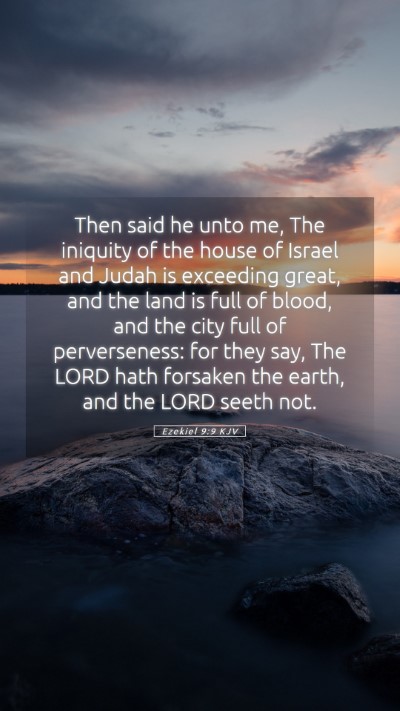Ezekiel 9:9 - Understanding the Meaning
Ezekiel 9:9 is a profound verse in the Old Testament that introduces a critical moment in the prophetic ministry of Ezekiel. This verse captures God's response to the wickedness of Jerusalem and the need for judgment. Below is a comprehensive summary, derived from public domain commentaries, exploring the significance, interpretation, and applications of this verse.
Verse Text
"Then said he unto me, The iniquity of the house of Israel and Judah is exceeding great, and the land is full of blood, and the city is full of perverseness: for they say, The Lord hath forsaken the earth, and the Lord seeth not." (Ezekiel 9:9)
Verse Explanation
The verse begins with God addressing Ezekiel and revealing the alarming state of the nation. A combination of sin and violence had permeated the land, leading to the impending judgment.
- Iniquity of the House of Israel and Judah: The term "iniquity" refers to the moral corruption and sinfulness that had escalated among God's people. It indicates a deep-seated guilt that demands attention.
- Land full of blood: This phrase illustrates the rampant violence and bloodshed that characterized their society, highlighting the spiritual and ethical decay.
- City full of perverseness: The word "perverseness" suggests a society that has turned away from God's moral laws, embracing corruption and depravity instead.
- Denial of God's Oversight: The people of Jerusalem were deceived, believing that God had abandoned them or was ignorant of their actions, which further justified their sinful behavior.
Bible Verse Interpretation
According to Matthew Henry, Ezekiel's vision conveys a solemn warning about divine retribution against sin. The commentary emphasizes God's awareness of human actions and His active role in the world, contradicting the people's misconception that He had forsaken them. Albert Barnes stresses that the extent of their iniquity is significant, indicating a complete departure from righteousness, which necessitates judgment.
Historical Context
The historical backdrop of Ezekiel's ministry involves a nation facing exile due to persistent unfaithfulness to God. The warnings given through Ezekiel serve as both condemnation and a call to repentance for the people.
Spiritual Applications
This verse invites believers to reflect on their own lives and the state of their communities:
- Self-Examination: It encourages individuals to assess their own iniquities and the impact of sin in their lives and communities.
- Awareness of God's Judgment: Recognizing that God sees all and is aware of injustices could lead to a healthier fear of the Lord and a desire for holiness.
- Call to Repentance: Just as the people were called to acknowledge their sins, readers today are invited to turn away from sinful behaviors and seek divine forgiveness.
Insights from Additional Commentators
Adam Clarke highlights the necessity of understanding the gravity of sin and the repercussions of ignoring divine warnings. His commentary suggests that the phrase about blood and perverseness serves to warn contemporary readers about the seriousness of spiritual neglect.
Related Bible Cross References
Several other Scripture passages resonate with the themes present in Ezekiel 9:9:
- Isaiah 59:3-4: Discusses the iniquities that separate people from God.
- Jeremiah 7:30-31: Aligns with the destruction brought upon Jerusalem for the people's idolatry.
- Lamentations 3:34-36: Speaks to God's justice regarding human actions and the corrupt practices faced by His people.
Conclusion
In conclusion, Ezekiel 9:9 serves as a stark reminder of the consequences of sin and the importance of recognizing God's constant oversight. Through biblical exegesis and commentary insights, the calling for self-examination and repentance remains relevant for today’s believers.
Further Study Suggestions
For those wishing to delve deeper into this topic and others, consider exploring Bible study groups or engaging in online Bible study resources that offer structured lessons and discussion on scripture analysis and understanding biblical texts.


